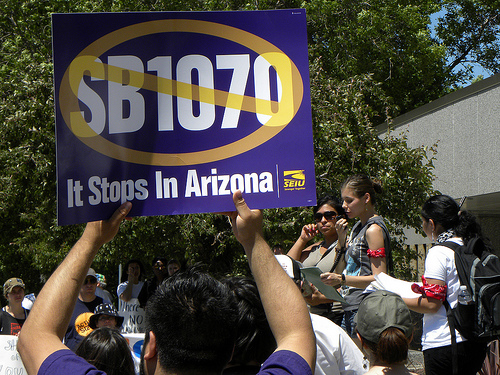
It may not stop in Arizona. (Photo: Fibonacci Blue/flickr)
If the first two weeks of this month are any indication, 2011 is going to be a headline-grabbing year for immigration legislation. On January 5, timed to coincide with the first day of work for the 112th Congress, a group of Republican state lawmakers let loose a fierce battle cry, promising to force the question of birthright U.S. citizenship for the children of undocumented immigrant parents all the way up to the Supreme Court.
On the heels of recent Republican election victories, a new report by the National Immigration Forum predicts that there are seven states with the right combination of conservative legislatures and governors to pass copycat SB 1070 legislation this year: Georgia, Oklahoma, Pennsylvania, South Carolina, Mississippi, Nebraska and Tennessee. The first four in that list, plus Arizona, will be pushing anti-birthright citizenship bills as well.
Most, if not all, of these controversial initiatives will be immediately challenged by civil liberties groups, and are expected to be blocked by the courts. So in the short term, they are largely symbolic, but that doesn’t mean they won’t have repercussions.
“I’m not worried that the Constitution is going to be turned upside down by anti-immigration, proponents but I am worried about how the language being used can be harmful,” said Angela Kelley at the Center for American Progress, a progressive think tank. Kelley pointed to words such as “malady,” “invasion,” and “criminals” that were used by Republican lawmakers at the birthright citizenship press conference.
Local and state proposals to restrict and monitor immigration have grown exponentially in the past decade, with 1,562 bills introduced in legislatures around the country in 2007, the same year the immigration debate reached a boiling point in Congress. In response, on Wednesday the Immigration Policy Center (IPC) released a guide to state immigration laws.
“People are frustrated and they’re looking for solutions,” said IPC’s Wendy Sefaf. She says polls show that Americans favor a comprehensive approach to immigration, but with the stalemate at the federal level, activity at the state level is evidence of people trying to get something, anything, done. It also seems likely that a number of elected officials are pushing controversial laws for political gain. “A lot of people look at (Arizona Governor) Jan Brewer and (Arizona State Senator) Russell Pearce (chief sponsor of SB 1070) —twelve months ago no one knew their names, and now they’re famous,” said Sefaf.
Muzaffar Chishti, director of the Migration Policy Institute‘s New York office, agreed there is a political dimension to state immigration bills.
“These things become particularly exciting during the election years, and much more toxic during the midterm elections,” Chishti said.
There’s also been a huge demographic shift—not only has undocumented immigration grown substantially in the past ten years, immigrants have left traditional magnet states like California and New York for places like Iowa and Indiana. States which have seen sharp increases in their immigrant population—but not necessarily those with the highest numbers of immigrants—seem the most likely to pass restrictive immigration bills. “For a number of these states, their introduction to immigration is relatively recent, and it has primarily come from the undocumented,” said Chishti. In 2008, forty percent of the nationwide undocumented population in the country had been here for five years or less.
Bills that require local law enforcement to function as immigration agents or that question birthright citizenship face major, and expensive legal hurdles. For states facing massive budget deficits, the cost could be significant. Sefaf suggests that states interested in these laws take a warning from what happened in Arizona. “The cost to mount the legal defense continues to rise, the cost to Arizona’s reputation continues to rise.”
Chishti says the majority of state immigration-related bills focus on law enforcement—which can mean anything from border security to cooperation with federal programs like Secure Communities; employment issues—such as requiring the use of e-verify; and requirements to carry legal immigration papers. Yet notably, some state legislators are trying to pass immigrant friendly bills, such as measures to allow undocumented students to pay instate tuition at public colleges (numerous states), bills that would allow undocumented workers to file workers compensation claims (Michigan), and guest worker programs (Utah).
Sefaf says Utah is one state to watch. The western state has experienced a recent influx of immigrants, and the past six months have seen a flurry of immigration proposals in the state legislature. Though State Representative Stephen Sandstrom introduced a bill that looked similar to SB 1070 last summer, State Senator Luz Robles recently introduced a guest-worker bill. Meanwhile, a bipartisan coalition of political, religious, business, and law-enforcement leaders have endorsed a “Utah Compact” to guide their immigration discussion.
“It’s smart because it forces Utahans to ask, does this piece of legislation fit in with our values?” Sefaf said.




